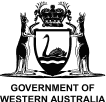Westport has partnered with the Western Australian Marine Science Institution (WAMSI) to deliver the $13.5 million WAMSI-Westport Marine Science Program. This 3-year program is developing the latest data, information and modelling on the complex environmental systems and community values associated with Cockburn Sound.
Project 4.3: Investigating effects of climate change on biota in Cockburn Sound
Research theme: Fisheries and Aquatic Resources
Researchers: P Mitchell, N Caputi, A Chandrapavan, D Johnston, A Tate, C Wellington and N Loneragan.
Publication date: December 2024
Understanding the impacts of climate change on plant and animal life in Cockburn Sound
Marine life, including animals and plants, is constantly changing, impacted by and reacting to different factors, from anthropological (human) through to natural (climate) at any given time.
To understand the potential impacts developing a port may have on Cockburn Sound, this research project investigated what the different climate related factors impacting local marine biota within Cockburn Sound are, their degree of impact, and the enabling factors that can be predicted and assessed.
The project used historical data and desktop research to determine the environmental and biological trends that have occurred and been observed over the past decades, and how Cockburn Sound has changed over that period. It identified what factors had played a role, with a focus on climate change, and specific impacts on key species in Cockburn Sound.
What the report found
- The major climate related factor affecting Cockburn Sound is an increase in water temperature, which exceeds the current global average rate of warming.
- Since records began (1887), the Fremantle mean sea level has increased at a rate of 1.76 mm yr-1. However, since the 1990s, sea levels have been rising at an accelerated rate, which may be attributable to climate change.
- Over recent decades, chlorophyll-a (as well as nitrogen and phosphorous) levels have declined in Cockburn Sound. While levels are currently stable, they are much lower than the peak industrial levels experienced in the 1990s.
- Potential climate change impacts from warming waters have both negative and beneficial impacts on different marine biota. For example, warming waters pose a severe risk to sandy sprat, little penguin, Australian sardine and southern garfish, while scaly mackerel, western rock octopus and yellowfin whiting may benefit from the warming temperatures.
How Westport will use the report
Westport will use this research to inform its environmental management program, including potential biological stressors and resulting mitigation activities, with the aim of supporting the long-term health of Cockburn Sound.
You can read the full report here.





